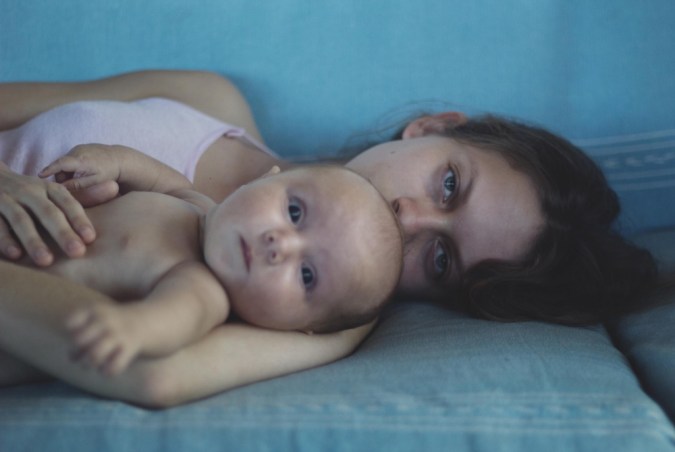Producing films that consistently push the moral boundaries of his characters, acclaimed Mexican filmmaker, Michel Franco, has amassed a body of work that defies narrative tropes and simplistic dichotomies. Amidst his fascinatingly unflinching domain you’ll find siblings who endured a deeply traumatic ordeal to save each other (Daniel & Ana), a young woman bullied mercilessly in the aftermath of her mother’s death (Después de Lucia), a caretaker dealing with terminally ill patients and struggling to let go (Chronic), and a social worker who takes advantage of the most vulnerable to help a loved one (A los ojos).
The latest addition to the Cannes-favorite’s lineup of troubling, yet truthful stories is Las hijas de Abril (April’s Daughter), starring Spanish actress Emma Suarez (most recently seen in Julieta) as Abril, the matriarch retuning to a fragmented household in Jalisco, Mexico. Newcomers Ana Valeria Becerril and Joanna Larequi portray her daughters, who find their lives upended upon her arrival. Franco’s storytelling is utterly grounded in reality; even if the people in his films are reprehensible, situations never veer into melodrama. Nonetheless, there is always subtle stylization in the way he frames and moves the camera, exhibiting his expert use of the medium.
In the opening scene of Abril, the director conceals and reveals information about the characters through his almost imperceptible choice of angles and camera movement. By the time the shot is over the viewer has learned more about the family dynamic than what a dialogue scene would provide. This knack for utilizing location creatively without being overtly noticeable is also seen in multiple interior shots during A los ojos, in how he blocks scenes with multiple actors in Después de Lucia, or the way wide shots and empty spaces highlight isolation in Daniel & Ana. His is a cautious high-caliber cinema.
After the US premiere of Las hijas de Abril at AFI Fest, Michel Franco talked with Remezcla about his interest in questioning motherhood, why popcorn seems to be more important to exhibitors than movies, and the reason he continues to watch movies on the big screen.
On Challenging Generalizations About Motherhood
I was interesting in motherhood seen in a different way because in Mexico we tend to idealize what a mother represents or signifies, and we think she will always be there in an unconditional way, and many other things that are not true. There are a lot of things that can’t just positively generalized. I also see more and more men and woman that refuse to accept that time has passed and that they are not the same as their children, and they compete with them. I found all of that interesting and I thought the movie could have a very different energy to my previous films. I was interested in the world of three women of different ages that have a past, a baggage, which is not explained but is felt in the movie. All of that was enough motivation to want to make April’s Daughter.
On Emma Suarez Coming on Board After Almodovar’s Julieta
I called [Emma] right after my idea to make the movie in the United States didn’t happen. There was an American actress with whom I had been working for several months. Suddenly things got complicated and that ended my desired to shoot it here. I felt the movie could work better in Mexico, but since I had already been working on the character with a foreigner [non-Mexican], the idea that Abril was from another place and that she had all this baggage was very appealing to me. I started thinking about who in the Spanish-speaking world was the best actress in that age group and with those characteristics, and Emma Suarez came to mind. We sort it out very quickly. It was a long time after Almodovar’s Julieta. Actually one of the reasons I thought of Emma was because I had seen her in Julieta months before. She did a great job with Almodovar, besides everything else she has done in her career. I believe she is at a very special point or interesting stage in her career. That’s what attracted me to want to work with her.
On the Depiction of Social Class in His Films
People have typecast me as a director who is concerned with the upper middle class, and it’s curious that A los ojos is the film that has received the least attention. It was a film that my sister and I shot over a year and a half in marginalized areas of Mexico City. So actually, there is less attention for those types of movies. People choose to pay more attention to things or content that might seem aspirational to them or whatever. That’s not my intention. I don’t create them from that perspective. But I am very interested in questioning the social abysses or social differences. Of course I’m interested in that. Living in Mexico, it’s something that doesn’t’ stop capturing our attention.

On Choosing a Beachside Location and Framing
I wanted to incorporate nature, and more specifically the sea as another feminine character. I liked that at the beginning of the film it felt like if it was almost a paradisiacal or ideal ideal, before Abril arrives to break that harmony. I thought the sea could bring that to the film through this house by the beach. Framing sometimes adapts to the location I found and sometimes I know that I need a certain camera angle, or that the door need to be a certain way or that the design of the room must be a certain way. It’s mix between both things. There are things that improve when you search for the location and sometimes we look for locations almost as if we were going to build a set. It’s a combination. It needs to feel natural. It’s not about just doing it out of stubbornness and pursuing something that makes no sense. Everything must be as natural as possible. In the films I’ve made, the sense of reality is what reigns, so one can’t defy that logic entirely, opposite to other kinds of cinema that I also like, but which is not what I’ve done thus far.
On Devising the Clever Opening Shot That Sets Up the Plot
The Director of Photography and I discussed for several weeks how to shoot that scene. The intention was clear from the screenplay and we had to find the right angle, but several things get compromised in that decision. At the beginning we had to see the door from where the girl is going to come out because it’s also where the noise comes from. It also had to be an angle that gave Clara, the other sister, something to do while she heard those noises. The camera needed to be able to travel naturally with Valeria -once she comes out and that we reveal she is pregnant- towards the sea, because we are also revealing that they live by the sea when the camera moves to the left. There are a lot of things happening in that single shot. Then the camera, still in that same shot, returns and finds the guy as he comes out of the room. It’s simple. It’s not a complicated take, but it is a 4-minute shot where a lot of information is revealed and a lot of things happen.
On the Perils of Film Exhibition in Mexico
I’ve been lucky that my movies get a lot of attention and spaces in movie theaters, but that’s not the same luck that all directors have. There are a lot of brilliant films that get lost or that only get attention at the Cineteca, but they are still judged with the same criteria as Wonder Woman. If they don’t have the same results as those big movies the first weekend, then they take them out. That’s absurd. Their only interest is to sell popcorn and not to offer something better for the audience or to build a more solid film industry. In the long run we all lose, the only one that wins is the one that sells the popcorn and the chocolates.

On Why He Prefers to Watch Movies on the Big Screen
It’s not about romanticizing it. Yesterday, I went to see Blow-Up at the Chinese Theater, and it was as if I was watching Blow-Up for the first time, because all the previous times I had seen it on television don’t count. Cinema is not just information, that’s why television is for. TV series, no matter how well made they are, are not cinematic. You cannot see Antonioni on an iPad and believe you have actually seen Antonioni. I’m not very interested on working in television. I also wont’ say I’m completely opposed to the possibility, but I’m much more interested in cinema.
On Up-and-Coming Mexican Filmmakers He Is Following
[Alonso] Ruizpalacios is one of them. He has just finished shooting his second feature, Museo. I wouldn’t say he is a new talent because Güeros had such a big impact and he has done theater before, but it’s only his second movie and I’m very interested in seeing what he did. There is also David Pablos (Las elegidas) who is going to make his third feature now. Directors that are working on their second or third feature, they are not starting out but they are venturing in deeper into cinema, as opposed to directors like Carlos Reygadas or Amat Escalante who are much more established. But that doesn’t mean that following them stops being interesting, on the contrary, the challenge to continue to maintain audiences interested after 6 or 7 films is bigger than at the beginning of your career. Speaking of directors who are in that process of making another feature, I’m producing Lorenzo Vigas’ second feature. He won Venice’s Golden Lion with his first film, From Afar, so there is a lot of anticipation for his follow-up. It’s titled, The Box, and we are going to shoot it early next year in Mexico. Lorenzo will make his first Mexican film.




